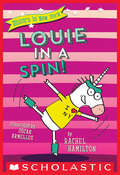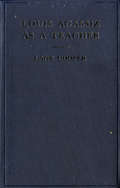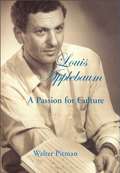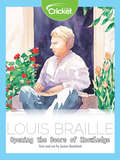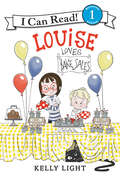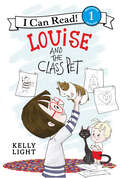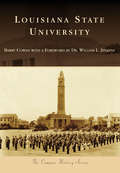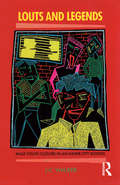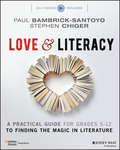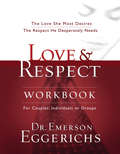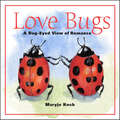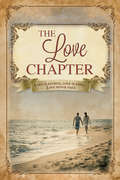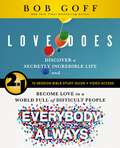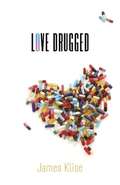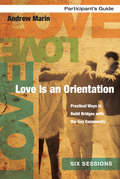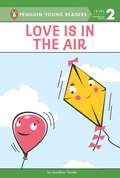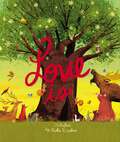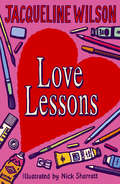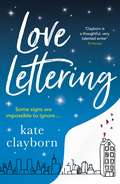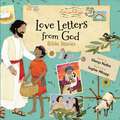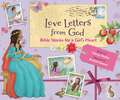- Table View
- List View
Louie in a Spin! (Unicorn in New York #3)
by Rachel HamiltonFame meets Unicorn School in this wonderfully wacky illustrated chapter book series!Louie the Unicorn is a star! At least, he will be once he polishes his act at performing arts school. With a song in his heart, a spring in his step, and an unwaveringly sunny outlook, he's about to take the big city by storm. It's time for this unicorn to shine!Louie's school has dance fever! But Louie's moves aren't exactly graceful. His dance teacher doesn't know how she'll ever train a unicorn with two left feet. Lucky for her, Louie has hooves! But when Louie mistakenly gets entered into a HUGE state-wide dance contest, everyone at school worries he'll make them lose for sure. Louie's going to have to give it his all and shake what his mama gave him if they are going to stand a chance!
Louis Agassiz as a Teacher: Illustrative Extracts on His Method of Instruction
by Lane CooperBy a succession of living pictures, as it were, this book shows the eminent naturalist in the very act of teaching. Sometimes he himself speaks, sometimes distinguished pupils of his reveal in their own words the process by which they were led to nature through direct and independent observation. The enthusiasm of their accounts is contagious.This collection of illustrative extracts on the ideals and practice of Louis Agassiz is probably unique in giving the actual methods of a great man of science in developing good students who could, in their turn, wisely instruct others. The book should be in the hands of all teachers, and of those who are preparing to teach.
Louis Applebaum: A Passion for Culture
by Walter PitmanCanadian composer Louis Applebaum devoted his life to the cultural awakening of his native land, and this "magnificent obsession" drove him to become a founder of the Canadian League of Composers and the Canadian Music Centre. He was an instrumental figure in the early development of the National Film Board, the Stratford Festival, and the National Art Centre in Ottawa. For nearly half a century he composed music for the Stratford Festival, television, radio, and films. This illustrated biography explores the man who was beloved by his fellow artists and the icon to whom every Canadian, knowingly or not, is indebted.
Louis Braille: Lives of the Physically Challenged Series)
by Jennifer Fisher BryantA biography of Louis Braille which is written for young adult readers. An excellent choice for a book report.
Louis Braille: Opening the Doors of Knowledge
by James RumfordIn the late 1700s, young Louis Braille overcame his disability by inventing "night writing," a system of raised dots to help blind people read. This alphabet of raised dots allowed sightless people to live more independent lives.
Louise Loves Bake Sales (I Can Read Level 1)
by Kelly LightLouise loves all kinds of art. But when she has to make cupcakes for a bake sale—and everything goes wrong—can she and her brother make messy cupcakes into art? This charming I Can Read story also introduces the concept of how mixing primary colors makes new ones, and that creativity comes in all different forms.Louise Loves Bake Sales is a Level One I Can Read book, which means it’s perfect for children learning to sound out words and sentences. This is the first Level One I Can Read starring Louise, from the acclaimed picture book Louise Loves Art.
Louise and the Class Pet (I Can Read Level 1)
by Kelly LightLouise is so excited! The class pet, Pigcasso, is staying over for the weekend! Louise’s cat is not as excited as she is, though.... Can they all make it through the weekend? Louise and the Class Pet is a Level One I Can Read book, which means it’s perfect for children learning to sound out words and sentences. This is the second Level One I Can Read starring Louise, from the acclaimed picture book Louise Loves Art.
Louisiana State University
by Dr William Jenkins Barry CowanLouisiana State University began in 1860 as a small, all-male military school near Pineville. The institution survived the Civil War, Reconstruction politics, and budgetary difficulties to become a nationally and internationally recognized leader in research and teaching. A devastating fire destroyed the campus in 1869, and the school moved to Baton Rouge, where it has remained. Successive moves to larger campuses in 1887 and 1925 created greater opportunities in academics, student life, and athletics. Academics began with classical and engineering courses. New majors in the arts, literature, engineering, agriculture, and the sciences evolved, along with research in those fields. Student life changed from military regimentation to coeducation and students' freedom to live off campus and make their own decisions. Intercollegiate athletics began in 1893 with baseball and football games against Tulane, and the LSU Tigers have since won numerous championships. These evolutionary steps all helped to create Louisiana's flagship university.
Louts and Legends: Male youth culture in an inner-city school
by J. C. WalkerFor five years, Jim Walker followed the stories of four groups of young men, from their last years at an inner-city high school to their early twenties. Louts and Legends is a rich portrayal of their ways of life, their responses to school and teachers, and their experience of job-seeking, employment, unemployment, further education and training.Louts and Legends presents a unique perspective on Australian culture, showing the problems, achievements, and social context of four distinct cultural styles: the macho 'Aussie' culture of the footballers; the competitive challenge of the Greeks; the 'nice guy' friendliness of the handballers; the artistic aspirations of the stigmatised three friends.The interview and participant observation data gathered over a long period contains fresh insights on youth culture as well as moving individual stories. The findings in this book pose a challenge to educational and social policy, but they also offer realistic suggestions for teachers, youth workers, parents and for other young people.
Loué sois-tu: lettre encyclique Laudato si' sur la sauvegarde de la maison commune
by Église Catholique FrançoisLoué sois-tu (Laudato si'), tel est le titre de l'encyclique du Pape François sur l'écologie et le respect de la création. Le discours du Pape se situe au niveau éthique et pastoral et confirme le souci manifesté depuis le début de son pontificat pour deux concepts-clé : l'urgence de la sauvegarde de la création et la lutte contre ce qu'il appelle la culture du déchet. 2015.
Love & Literacy: A Practical Guide to Finding the Magic in Literature (Grades 5-12)
by Paul Bambrick-Santoyo Stephen ChigerWhen our students enter middle and high school, the saying goes that they stop learning to read and start reading to learn. Then why is literacy still a struggle for so many of our students? The reality is that elementary school isn’t designed to prepare students for Othello and Song of Solomon: so what do we do? Love and Literacy steps into the classrooms of extraordinary teachers who have guided students to the highest levels of literacy. There is magic in their teaching, but that magic is replicable. It starts with a simple premise: kids fall in love with texts when they understand them, and that understanding comes from the right knowledge and/or the right strategy at the right time. Love and Literacy dissects the moves of successful teachers and schools and leaves you with the tools to make these your own: Research-based best practices in facilitating discourse, building curriculum, guiding student comprehension and analysis, creating a class culture where literacy thrives, and more Video clips of middle and high school teachers implementing these practices An online, print-ready Reading and Writing Handbook that places every tool at your fingertips to implement effectively Discussion questions for your own professional learning or book study group Great reading is more than just liking books: it’s having the knowledge, skill, and desire to experience any text in all its fullness. Love and Literacy guides you to create environments where students can build the will and wherewithal to truly fall in love with literacy.
Love & Respect Workbook
by Dr Emerson EggerichsBased upon Ephesians 5:33 and extensive biblical and psychological research, Dr. Emerson Eggerichs reveals the power of unconditional love and unconditional respect and how husbands and wives can reap the benefits of marriage that God intended.
Love Bugs: A Bug-Eyed View of Romance
by Maryjo KochYou don't have to be an entomologist to appreciate the wonderfully realistic watercolor insect images found inside Maryjo Koch's Love Bugs. Offering a "bug-eyed view of love and courtship," Love Bugs presents more than 25 images of dancing dragonflies and bouncing beetles paired with romantic prose.Lovebugs, speckled bugs, grasshoppers, dragonflies, butterflies, and more are compellingly captured by the stroke of Koch's paintbrush and presented alongside humorous and thoughtful entries, such as:* You can't buy love, but presents make a nice first impression.* Opposites attract because they're complementary.* Being in love is like friendship set to music.
Love Chapter: 1 Corinthians 13
by Rose PublishingThe Love ChapterIn The Love Chapter, enjoy having a close - up look with Dare to Love as you read line by line through 1 Corinthians 13. Be encouraged and challenged as you gain a clearer understanding of what love really is and how to practically show it to those around you - whether it's a spouse, child, friend, or neighbor.
Love Does/Everybody Always 2-in-1 Bible Study Guide plus Streaming Video: Discover a Secretly Incredible Life and Become Love in a World Full of Difficult People
by Bob GoffPut God's audacious love into action. Two classic Bible Studies bundled into one!How do you live out your faith in a world that challenges you at every turn? What if the secret to a fulfilling life isn't just understanding love but becoming it?Bob Goff's 2-in-1 Bible study guide, Love Does/Everybody Always, invites you to discover what it means to embody God's audacious love—even when faced with life's most difficult people and circumstances. These studies will inspire you to move beyond mere belief into bold, transformational action.Bringing together two of Bob Goff's beloved works, Love Does and Everybody Always, this study guide includes ten life-changing sessions.Perfect for fostering meaningful conversations and spiritual growth, the study guide is thoughtfully designed to inspire and equip you to express God's love in practical ways. You'll explore themes of risk-taking love, grace, and humility through hands-on activities and engaging discussion questions. This 2-in-1 Bible study will help you experience God's love more fully and live it out boldly.This study guide includes:Individual access to ten streaming video sessionsVideo notes and comprehensive structure for group discussion timePersonal study for deeper reflection between sessionsA guide to best practices for leading a groupAn action guide to help you put God's love into practiceStreaming video access code included. Access code subject to expiration after 12/31/2029. Code may be redeemed only by the recipient of this package. Code may not be transferred or sold separately from this package. Internet connection required. Void where prohibited, taxed, or restricted by law. Additional offer details inside.
Love Drugged
by James KliseFifteen-year-old Jamie is dismayed by his attraction to boys, and when a beautiful girl shows an interest in him, he is all the more intrigued by her father's work developing a drug called Rehomoline.
Love Is an Orientation Participant's Guide: Practical Ways to Build Bridges with the Gay Community
by Andrew Marin Ginny OlsonMuch of today's culture defines bridge-building and reconciliation as a one-way street that leads to full theological, political and social agreement. Yet Christ demonstrated a different path of religious and cultural engagement to establish his kingdom here on earth. In light of such countercultural principles, the Christian community needs a new view on the issues that divide conservative believers and the lesbian, gay, bisexual and transgender (LGBT) communities. Using the practical applications Andrew Marin has learned over the last decade of living and working in the LGBT neighborhood of Chicago called Boystown, as well as his international speaking and consulting ministry, this six-session, video-based study offers a variety of practical teachings, insights and life lessons. Rather than avoiding the topic of homosexuality, Love Is an Orientation aims to equip the Christian community to bridge the gap between LGBT and religious communities. This is not a study about “fixing” gay people. It’s about getting to know people, engaging them, and loving them like Jesus does. Designed for use with the video.
Love Is in the Air (Penguin Young Readers, Level 2)
by Jonathan FenskeMo Willems meets Dr. Seuss! This is the sweet story of a lonely balloon falling in love with a lively kite, and the adventures they share high in the air--flipping, dipping, spinning, and playing in the clouds. With bright and bold graphics, this accessible Level 2 reader, which is available in both hardcover and paperback, is one that parents and children will read over and over again!
Love Is: An Illustrated Exploration of God’s Greatest Gift (Based on 1 Corinthians 13:4-8)
by Zondervan&“Love is patient, love is kind.&” These familiar words from the Bible begin one of its most beloved and recognized passages. Love Is brings the text of 1 Corinthians 13 to life through an illustrative exploration of God&’s greatest gift to us.Critically acclaimed artist Paola Escobar delivers beautiful, nature-filled illustrations , reminding us that love is a constant positive force in the lives of those touched by it–from beginning to end, through good times and tough times.This beautiful, jacketed hardcover:Will appeal to parents and grandparents of children ages 4-8Draws directly from the New International Reader&’s Version of the Holy BibleFeatures stunning illustrations by award-winning artist Paola EscobarIs perfect for gift-giving for Christmas, Valentine&’s Day and birthdaysIs especially giftable for anniversaries, engagements or weddingsLove Is shares imaginative, thought-provoking depictions of the concepts found in 1 Corinthians 13, presenting opportunities for thoughtful conversations about love, selflessness, service, humility, honor, self control, trust, hope and perseverance. Read this picture book aloud to someone you love ... over and over again.
Love Lessons
by Jacqueline WilsonFourteen-year-old Prue and her sister Grace have been educated at home by their controlling, super-strict father all their lives. Forced to wear Mum's odd hand-made garments and forbidden from reading teenage magazines, they know they're very different to 'normal' girls - but when Dad has a stroke and ends up in hospital, unable to move or speak, Prue suddenly discovers what it's like to have a little freedom. Sent to a real school for the first time, Prue struggles to fit in. The only person she can talk to is her kindly, young - and handsome - art teacher, Rax. They quickly bond, and Prue feels more and more drawn to him. As her feelings grow stronger, she begins to realise that he might feel the same way about her. But nothing could ever happen between them - could it?
Love Lettering: The charming feel-good rom-com that will grab hold of your heart and never let go
by Kate Clayborn'Lyrical and engrossing . . . bursting with humour' - Entertainment WeeklyThe thing is, the letters don't always tell me truths about myself. Sometimes they tell me truths about other people. And Reid Sutherland is - was - one of those people. In the last year, Meg Mackworth's beautiful hand-lettering skills have seen her rocket to social media fame, and now she has a booming business crafting stationery for the stars. But she has a secret: sometimes, she just can't resist hiding messages in her work. Slightly unprofessional, maybe - but harmless. Right? Analyst Reid Sutherland and his gorgeous fiancée had their future mapped out. Until he noticed a pattern in his wedding invitation that made him think twice.When Meg looks up from her desk one day and sees Reid standing in front of her with no wedding ring, holding the invitation she created, she thinks that her career is over.But her life may be about to begin . . .Escape into a beautiful world of craft and romance that will grab hold of your heart and never let go.Praise for Kate Clayborn'Clayborn is a thoughtful, very talented writer' - BookPage'Hilarious and moving and sexy' - Buzzfeed'A warm and lively romance' - New York Times'Clayborn's characters are bright and nuanced, her dialogue quick and clever, and the world she builds warm and welcoming' - Washington Post'A layered and memorable love story . . . smart, sexy and sublime' - USA Today
Love Letters from God: Bible Stories (Love Letters from God)
by Glenys NellistWhat child does not love to receive mail? What if your child could receive and read his or her own personal mail from God? Love Letters from God invites them to do just that! With 18 of the most popular Bible stories, each story is accompanied by a special and encouraging letter. Love Letters from God is the first book in the series written by Glenys Nellist. Unique features include:18 letters from GodGorgeous, bright illustrations by Sophie Allsopp9 stories from the Old Testament and 9 stories from the New TestamentThis picture book is perfect for ages 4–8 and is great for birthdays, Easter baskets, Valentine&’s Day, holiday gift giving, or as an addition to your child&’s digital library.Check out other titles from this series, Love Letters from God: Bible Stories for a Girl&’s Heart, Easter Love Letters from God: Bible Stories, and Christmas Love Letters from God: Bible Stories.
Love Letters from God; Bible Stories for a Girl’s Heart: Bible Stories For A Girl's Heart (Love Letters from God)
by Glenys NellistAre you looking for a way to teach your child about the incredible women in the Bible? This heartwarming picture book will fill girls&’ hearts with the wonder of Lord. With 14 Bible stories about women who made a difference, each story is paired with a heartfelt letter from God in its own envelope and beautiful illustrations. Bible Stories for a Girl&’s Heart is part of the Love Letters from God series written by Glenys Nellist. Unique features include:14 letters from God, enclosed in an envelope your child can open, and personalization space to write your child&’s name on each letterGorgeous bright illustrations by Rachel Clowes7 stories from The Old Testament and 7 stories from The New TestamentThis picture book is perfect for ages 4-8 and is great for birthdays, Easter baskets, Valentine&’s Day, holiday gift giving, or as an addition to your child&’s home library.Check out other titles from this series, Love Letters from God: Bible Stories, Easter Love Letters from God: Bible Stories, and Christmas Love Letters from God: Bible Stories.
